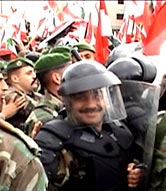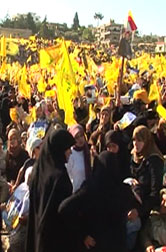Can Lebanon, a country of 18 different ethnic groups that fought a 15-year civil war, now achieve true independence and overcome renewed divisions within?
by Michael Young
July 2005
There is gloom in Lebanon these days, as the public feels little has really changed since the Syrian Army withdrew in April. The reality, however, is that everything has changed, though many of the same political actors will remain at center stage. What the Lebanese ignore — especially amid the high expectations following the public demonstrations against Syria after the assassination of former Prime Minister Rafik Hariri on February 14 — is that, in their country, change and continuity tend to advance together.
The Lebanese political system is sectarian, and will continue as such for the foreseeable future. Parliament is divided evenly between Christians and Muslims, though the latter are a majority, while the three highest posts in the state — that of president, prime minister and speaker of parliament — are reserved for Maronite Christians, Sunni Muslims and Shia Muslims, respectively. The tendency is to regard this setup as backward; however, it has imposed compromise on all since no one community can hope to control all the others; it has also allowed for democracy in a region replete with despotism, since the state is weaker than society’s component parts.
Yet, in this environment, what is taking place today is a hardnosed struggle over Lebanon’s future. Domestic political actors, but also unwanted Syria, the United States, and France, are seeking to fill the vacuum left by the Syrian departure. Many Lebanese find this struggle unbecoming in the shadow of the massive March 14 rally that brought together about a million or more Lebanese in a show of national solidarity. They may well be right, however that astonishing event was also a Rashomon moment. People read it and its long-term implications in different ways, even as a majority did agree then on two commonalities: that Syria had to leave Lebanon; and that the gathering was necessary in response to a large March 8 rally organized by Hezbollah, which tried to show that Lebanese opposition to Syria was less widespread than believed.
What subsequently gelled public displeasure was passage of an unpopular law for parliamentary elections in May and June. The law was a variation on the 2000 election law, a gerrymandered monstrosity shaped by Syria. Yet for politicians across the political spectrum, it had the advantage of consolidating their hold on power. The paradox was that the law was agreed upon by opposition groups: the Hariri bloc, Druze leader Walid Jumblatt, and some members of a Christian grouping known as Qornet Shehwan — as well as pro-Syrian groups, such as Hezbollah and the Amal movement of Parliament Speaker Nabih Berri. This was a traditional Levantine compromise, but for many onlookers it was also unprincipled, since the law merely ensured the dealmakers would dominate the new parliament.
Where the convenient arrangement broke down was in its furious rejection by most Christians. Indeed, the law marginalized the more representative Christian opposition groups, or made them subordinate to Hariri and Jumblatt. It also denied independent Shias a parliamentary presence, by ensuring that Hezbollah and Amal would triumph in predominantly Shia constituencies in the South and the Bekaa Valley.
Among Christians, the main beneficiary of this anger was Gen. Michel Aoun, the former head of a military government in 1988-90 who, in May, returned from long exile for having opposed Syrian hegemony in Lebanon. Aoun particularly attacked opposition politicians behind the election deal, accusing them of corruption, prompting ripostes that he was dividing the opposition. The general has presidential ambitions and was surely keen to eliminate possible rivals from within his Maronite community; however, he also tapped into genuine, and understandable, Christian discontent, and was rewarded by the victory of his candidates in several constituencies, earning him the largest Christian bloc in parliament.
Aoun’s successes notwithstanding, the election results favored the election law dealmakers — most notably Saad Hariri, the son of Rafik Hariri and newly crowned prince of Lebanon’s Sunni community. With his allies, he controls just under two-thirds of parliament. Hezbollah and Amal, predictably, swept the Shia community. Jumblatt earned a Pyrrhic victory in the districts where he is influential: In a harsh race in the Aley-Baabda constituency, his candidates won, but only thanks to the Hezbollah vote, after the Druze leader had alienated his own Christian electorate.
Disarming Hezbollah, which the United Nations calls for in its Resolution 1559 that demanded a Syrian withdrawal, is the next step for the international community. Inside Lebanon, however, the prospect of disarming the most powerful militia against its own will is regarded with trepidation, partly because many Shias consider, rightly or wrongly, such a move as designed to weaken them. Moreover, without weapons Hezbollah would lose its militant identity. This suggests tough bargaining, or worse, ahead, with Hezbollah unwilling to give up its weapons and the other communities, while not wanting a confrontation, loath to stand athwart the U.N. for the sake of a militia, and community, that alone remains armed.
This complex situation allows no ready solutions to Lebanon’s myriad other challenges — eliminating what remains of the Syrian intelligence presence, which is almost certainly responsible for the bombs and assassinations continuing to this day; reducing a large national debt that might, otherwise, bring about economic collapse; deciding the fate of President Emile Lahoud if it is discovered that he or associates knew about, or helped cover up, the Hariri assassination; reforming the public administration; passing a new and fair election law; and much more. The ambient confusion will also stymie the public’s palpable appetite for an amelioration of political life.
However, Lebanon has resources and a sense of priorities. In its competition, the political class will probably find equilibrium. Change will not be as profound as people desire, but indefinite stalemate is hardly an option either. It’s to move beyond that that a million people came together on March 14, and no one, politicians or otherwise, can forget it.
Michael Young is opinion editor of THE DAILY STAR newspaper in Lebanon and a contributing editor at REASON magazine in the United States.



